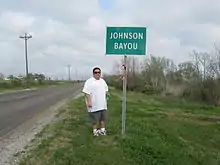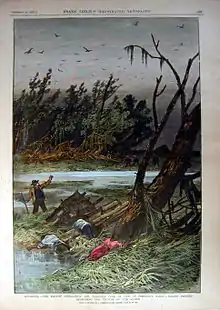Johnson Bayou, Louisiana
Johnson Bayou is a small unincorporated community located on the Creole Nature Trail along the Gulf Coast in Cameron Parish, Louisiana, United States, and is named after Daniel Johnson, who came to the area circa 1790. The village is a barrier island spread across coastal chenieres which were formed by deltaic sedimentation by the shifting of the Mississippi River. This geologic formation, the coastal cheniere , is found only in a few locations across the globe. The population of the community is approximately 400.
Johnson Bayou, Louisiana | |
|---|---|
 Johnson Bayou, Louisiana Location of Johnson Bayou in Louisiana | |
| Coordinates: 29°45′47″N 93°41′55″W | |
| Country | United States |
| State | Louisiana |
| Parish | Cameron |
| Elevation | 0 ft (0 m) |
| Time zone | UTC-6 (CST) |
| • Summer (DST) | UTC-5 (CDT) |
| Area code(s) | 337 |
Johnson Bayou is part of the Lake Charles Metropolitan Statistical Area.

History
On October 12, 1886, Johnson Bayou was completely destroyed by the "great storm of 1886;" a storm surge of between seven and twelve feet that swept inland at Johnson Bayou, killing between 50 and 100 people.[1][2][3][4][5] Between Sabine Pass and Beaumont, thirty miles of track of the Sabine and East Texas Railway, were damaged badly and partly washed away.[6]
Johnson Bayou was hit again by Hurricane Audrey in 1957, and yet again by Hurricane Rita on September 24, 2005. On September 13, 2007, Hurricane Humberto made landfall west of Johnson Bayou at High Island, Texas, bringing heavy rains to the community. On September 13, 2008, Hurricane Ike made landfall on the upper Texas coast, causing extensive damage to the region (NOAA).
Geography
Location: 29.7613323 -93.6584918 (29°45'40"N 93°39'30"W). Elevation: 5 to 7 feet (2 m).
Johnson Bayou is located a barrier island on Louisiana Highway 82, 12 miles (19 km) west of Holly Beach, and 28 miles (45 km) southeast, across the Sabine Pass channel, of Port Arthur, Texas.
Culture
The Holleyman Bird Sanctuary/Peveto Woods Bird and Butterfly Sanctuary is located in the community, and is south of the Sabine National Wildlife Refuge. Johnson Bayou is home to four natural gas pipelines, and the future home of one of the largest LNG Terminals in the world. This LNG regasification terminal is being built by Cheniere Energy. https://web.archive.org/web/20071215224830/http://www.cheniere.com/default.shtml
Education
Cameron Parish School Board operates Johnson Bayou High School, a combined primary and secondary school serving the area.
Cameron Parish Public Library operates the Johnson Branch at 4586 Gulf Beach Highway in the area.[7]
Gallery
 Destruction from the Great October Hurricane of 1886
Destruction from the Great October Hurricane of 1886 The beach between Johnson Bayou and Holly Beach prior to Hurricane Rita in 2005
The beach between Johnson Bayou and Holly Beach prior to Hurricane Rita in 2005 A house in Johnson Bayou destroyed by Hurricane Rita
A house in Johnson Bayou destroyed by Hurricane Rita Hurricane Ike damage to main store and buildings
Hurricane Ike damage to main store and buildings Hurricane Ike damage to school building
Hurricane Ike damage to school building School suffered severe damage inside building due to Hurricane Ike
School suffered severe damage inside building due to Hurricane Ike Church and buildings damaged by Hurricane Ike
Church and buildings damaged by Hurricane Ike Brick house completely destroyed with nearby double wide house severely damaged from Hurricane Ike
Brick house completely destroyed with nearby double wide house severely damaged from Hurricane Ike
See also
References
- Galveston Daily News, October 14–23, 1886.
- Roth, David. "Louisiana Hurricane History: Late 19th century" – the National Weather Service at NOAA
- Roth, David. "Texas Hurricane History: Late 19th century" – the National Weather Service at NOAA
- Block, W. T. "October 12, 1886: The Night That Johnson's Bayou, Louisiana Died" – the Beaumont Enterprise – October 10, 1979
- Block, W. T. "The Great Storm of 1886" – the Beaumont Enterprise – January 9, 1977
- Block, W. T. "The Romance of Sabine Lake: 1777–1900" – Texas Gulf Historical Society – 1973
- Young, Nancy Beck. "Sabine and East Texas Railway" – Handbook of Texas Online – (accessed September 14, 2007)
- "Louisiana Library Directory." State Library of Louisiana. Accessed September 22, 2008.
| Wikimedia Commons has media related to Johnson Bayou, Louisiana. |
